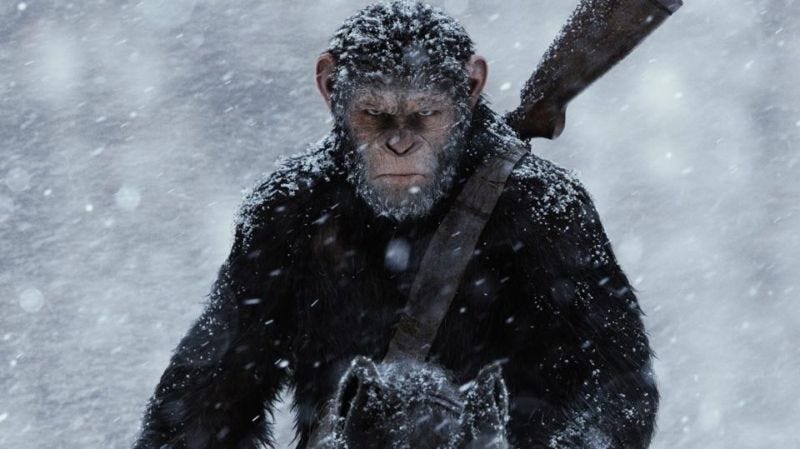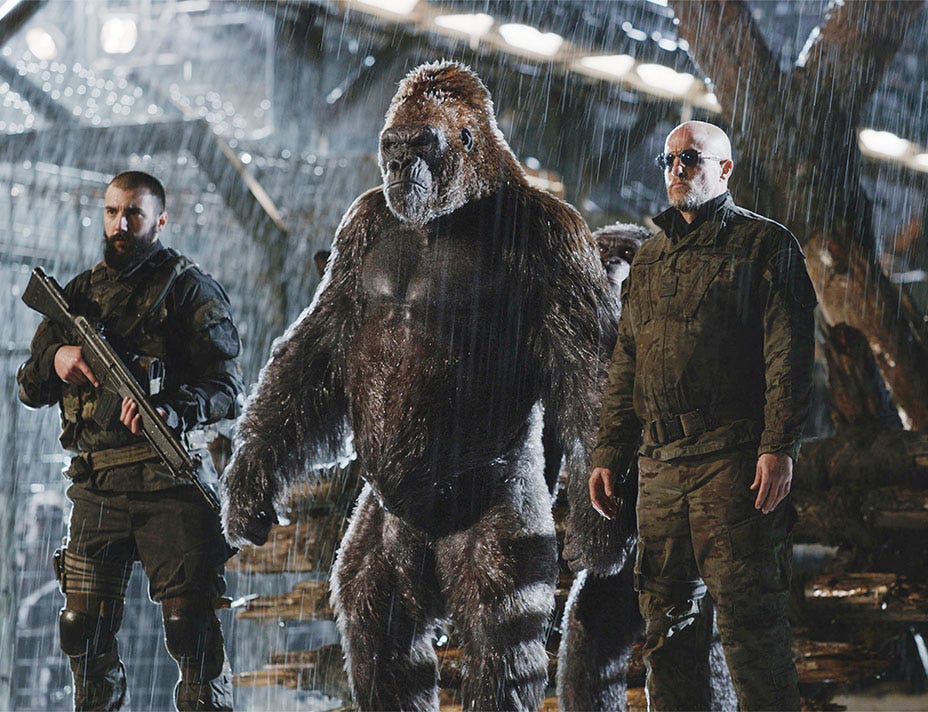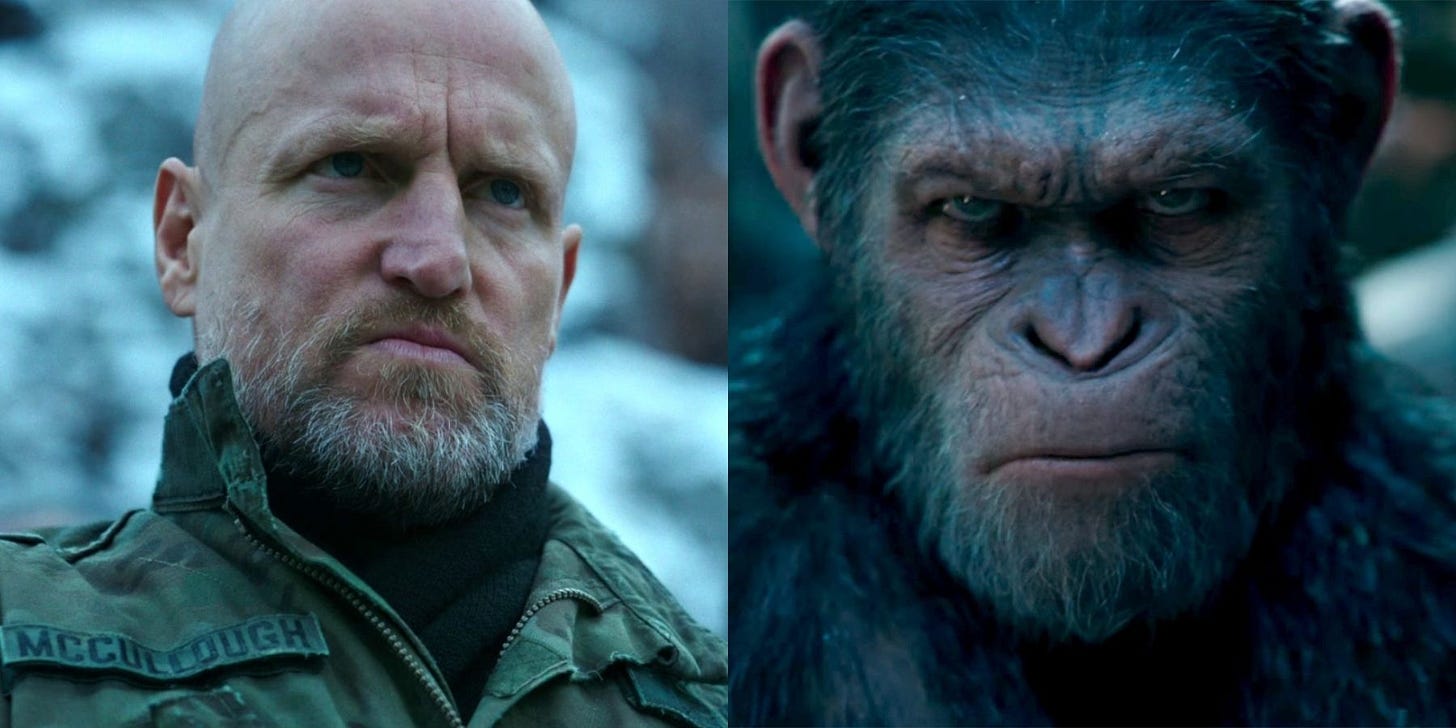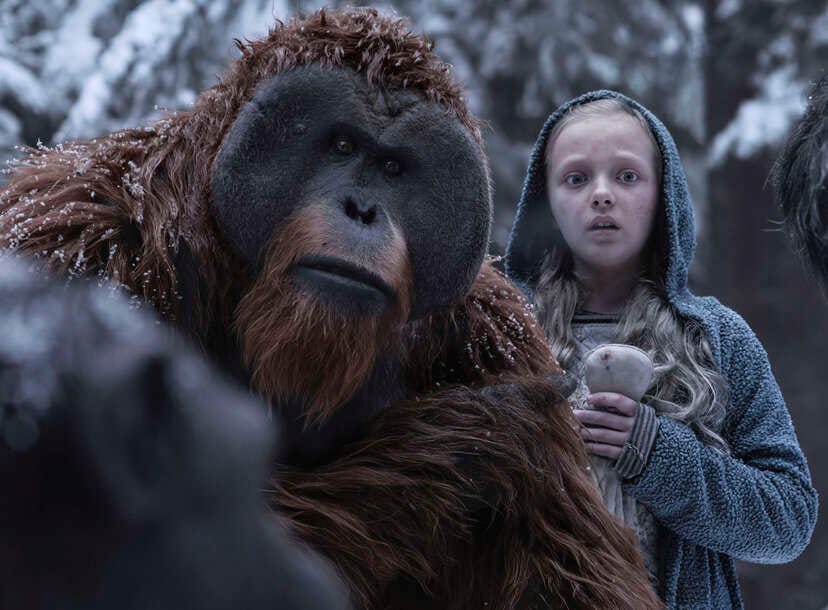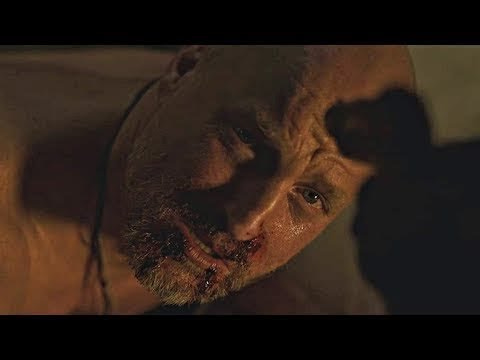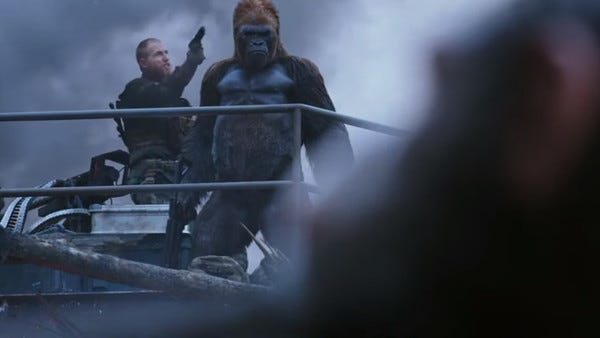The Forgotten Trilogy: Part Three
Why the Planet of the Apes is the Best Trilogy of the 2010s
War of the Planet of the Apes
The third movie “War of the Planet of the Apes” starts with the apes and an army of humans involved in a war that had been going on for around two years and was mostly guerrilla warfare, no pun intended. Apes and gorillas who were previously followers of Koba, did not wish to follow Caesar had left the tribe, and it seems some or all of them went and gave themselves over to the humans to help them defeat the apes. I guess this goes in line with the quote “The enemy of my enemy is my friend.” But these monkeys that serve the humans are treated as second-class citizens and just carry heavy loads for the soldiers and they are given the derogatory name of ‘donkey’. I do not know if this name has to do with the four-legged animal or if it is a reference to Donkey Kong. Either would work I guess. Two new major characters are introduced that are very important to the plot. There is Red, a red gorilla, one of the traitors who had joined the humans. Then there is the psychopathic antagonist called ‘The Colonel,’ He is masterfully portrayed by Woody Harrelson.
Attempted Assassination and Betrayal
It begins in a battle where the humans, under orders by the Colonel ambush an ape outpost and then are themselves ambushed. Two humans are spared by Caesar and Red, the traitorous gorilla who was taken captive as well, is allowed to escape by another Gorilla named Winter. Caesar's son ‘Blue Eyes’ returns from a journey with Rocket, one of Caesar's closest friends, having found a promised land. Staying with the idea of Caesar being a Moses, ‘A land flowing with Milk and Honey.’ They plan to leave soon, to flee the humans and go to this safe land. But their plans are interrupted that very night. The Colonel himself sneaks into their home with a few soldiers looking for Caesar. The Colonel Inadvertently murders almost all of Caesar's family, leaving only his son Cornelius, a very young ape, who had hidden himself.
Now Caesar begins to change, and his priorities change. He now is filled with hatred and deep urgings for vengeance. He wants to kill the Colonel now. He sends all of his ape tribe to find the Promised Land while he goes hunting the Colonel. But his closest friends refuse to let him go alone. They happen to stumble upon a young human girl who cannot speak. Maurice who has seen the worst of humans, just like Koba had, is the one who demands that they show kindness to her. Caesar had shot her father when he was about to shoot them, therefore, Maurice felt responsible, and he would not leave her. Hence, Caesar had them bring the girl with them.
Eventually, they find a human camp with Winter the great white gorilla working in the camp. This is when Caesar realizes that Winter had betrayed him and kills him. Caesar once more breaks the commandment “Ape not Kill Ape.” But he does not care at this point; he is hurt, full of rage, and desires revenge.
Revelations and Captivity
As they arrive near the base, to Caesar’s surprise he finds human bodies, with signs that humans were being shot by other humans. One is still alive but dies quickly from his wounds, but he cannot speak, just like the young girl who is with them. This leaves the apes wondering why some humans cannot speak and why humans are shooting humans. Luca, a gorilla who followed Caesar, is mortally wounded protecting Caesar from an attacking human. As he is dying the young mute girl begins weeping over him and returns a little flower behind his ear he had put behind her ear a few scenes earlier. Caesar is visibly moved by this show of emotion, from a human for an ape. He had never seen a human weep over the death of an ape before. Maurice then tells Caesar that this must stop. This streak of darkness and vengeance within Caesar needed to come to an end. Caesar not willing to let go of his revenge declares “They must pay.” Maurice, always the truth speaker for Caesar, bravely tells Caesar “Now you sound like Koba.” Caesar is not ready to hear this. How dare Maurice compare him to that hateful creature, Kobe, whom Caesar had declared not an ape at the end of the previous movie. He becomes indignant, insulted, and angry. He spits back that he should not have brought them and he leaves heading down toward the human camp. Caesar is ambushed, knocked unconscious, and taken to the human camp.
Caesar wakes in the human camp and realizes his great folly. While he was gone, foaming at the mouth with lust for revenge, his tribe had been stumbled upon by the Colonel and his troops. Almost all his warriors were slain, and the apes thought the humans would slay all of them but the Colonel commanded them to stop. They needed the apes, they needed their strength. The Colonel was using them to finish his fortress. Caesar had learned from his quickness to observe that another group of humans was coming to attack the Colonel’s troops. The Colonel had named his forces Alpha and Omega, the beginning and the end. Another strong scriptural reference, having to do with one of the names of God, he is both the beginning and the end. We will see that this Colonel has quite a god complex.
Shame and Guilt
Caesar is overwhelmed with feelings of pain, guilt, and self-loathing. He had left his tribe and they were attacked when they needed him. He had allowed himself to become consumed with rage and vengeance. I believe he may even have seen how he had become just like Koba. He realized he needed to change. He needed to repent. His goals changed or realigned to where they were supposed to be. He began to focus on his tribe, he needed to get them out somehow, he needed to rescue them out of the prison they had fallen into because of his neglect. Now once more we begin to see the best of Caesar, he is quick-thinking and a brilliant strategist. When filled with the spirit of revenge Caesar is not at his smartest or his best. It is when Caesar has a higher and loftier goal that Caesar shines, as I believe is true for all of us. Sure Caesar would still like to avenge his family's murder, but that is now a secondary goal only. But Caesar would have to overcome something else first, his tribe had lost faith in him.
The Greatest Scene of Antagonist Meeting Protagonist
Caesar speaks with the Colonel on a few different occasions and he even stands up to the Colonel because his tribe was being forced to build a wall without food or water. This led to the execution of an orangutan. Caesar is then made an example of and tied to wooden stakes out in the snow to die. During the night he is brought in to speak with the Colonel. What follows I think is the best scene in all of the Planet of the Apes trilogy and perhaps one of the best in television. The Colonel warns Caesar if he interrupts the work again he will begin shooting all the apes. Caesar once more demands food and water. The Colonel refuses. Caesar tells the Colonel he has no mercy. The Colonel is taken aback and looks frustrated, but it is a quiet and controlled frustration. He points out Caesar’s hypocrisy that Caesar was coming to kill him, would Caesar have shown him mercy? Caesar then begins to ask questions about why the Colonel was shooting his own men and points out that he thinks the Colonel is going to be attacked by other humans. The Colonel is surprised by Caesar’s powers of deduction.
The Colonel then reveals to Caesar the doom that awaits mankind and also exposes his god complex. He explained that some humans had begun to lose the ability to speak and some humans were taking their mute family members and fleeing the Colonel. The Colonel’s own son became mute, with other soldiers. The Colonel said that the original virus had mutated and was now destroying humanity's ability to speak and their higher brain functions. The Colonel realized what he needed to do. He needed to put an end to this virus. Therefore, he shot his son and the other mute men. He declared that he ‘sacrificed his only son, that humanity might live.’ Thus putting himself in a similar line with god himself. Once more referencing scripture. The other humans sent scientists to him explaining that they could reverse the virus, the Colonel did not believe them and killed them. That was why the other force of humans was coming to attack his base.
The Colonel then made a very clear point to Caesar, that they were involved in a holy war. The apes were stronger and smart and they were chosen by nature to supercede humans, if the humans lost their speech and higher brain function, then the humans would become cattle and the earth would become a ‘planet of apes’. The Colonel then further explained that he was sorry he killed Caesar’s son Blue-Eyes. But “If he was the heir to your unholy empire, then I am glad I did.” Caesar lost control and almost killed the Colonel before Red pulled him back. This scene, Woody Harrelson’s stellar performance, and the interaction between him and Caesar always sends chills down my spine.
Angel in the Night
Caesar almost dies of hypothermia, because night after night he is left out in the cold, and once Red, the traitorous gorilla, dumped ice water upon him, further forcing him into hypothermia. But Caesar witnesses a small victory, food being delivered to his apes by the humans. His tribe, now being able to eat, look at him with smiles and a willingness to follow once more. Their faith in him was restored. Perhaps Caesar could rescue them again. But Caesar was near death. But then a miracle happened, like an angel in the night, the mute human girl waltzed directly into the camp without taking any cover at all. She, as a human, albeit a fallen, dumb, and mute one, shows mercy and kindness to Caesar. She brings him food and water in his cage. Caesar is shocked to see her and further surprised at her goodness and mercy, the mercy that the Colonel was reluctant to show. Then just as mysterious as angels in the good book, the young angel disappears into the night. But not before she left Caesar a gift, something sweet, the doll she had brought with her for the entire journey. But it would become the bane or Pandora’s box for the Colonel. The Colonel later finds it and takes it back to his quarters.
Devolution
That night the apes escape but in the wee hours of the morning are caught in the middle of the battle between the two human factions. Caesar goes to find the Colonel for vengeance now that he fulfilled his duty to his tribe. The Colonel’s room is a mess, and there is blood on his table, and the doll is visible as well. Caesar finds the Colonel’s sidearm and then finds the Colonel lying in his bed with a bottle of booze. It looks like Caesar caught the Colonel drunk or in a hangover. But it was strange that the sounds of battle had not woken him. The Colonel awakes and their eyes meet. The human’s face was smeared in blood from the nose, just like the humans Caesar had found previously. The Colonel opened his mouth but could not speak. Caesar realized that the Colonel had become infected with the mutated virus and had lost his ability to speak and his use of higher brain centers. Perhaps caused by the doll the young mute girl had been carrying the entire movie, lathering it with the viruses that she carried, that the Colonel had unwittingly decided to bring back to his abode. But the Colonel still had a semblance of understanding left. He looked pained, lost, and wished to die. He could see that Caesar wished to kill him. He grabbed the pistol Caesar carried and aimed it at his own head as if saying “Yes, please end my misery, I do not wish to live as a dimwitted human.” Caesar desires this and he begins to grunt and breathe hard with his hands shaking holding the pistol. This was the man who had slain his wife and son and caused the death of hundreds of apes. Now was his chance for vengeance, now he could have justice. But Caesar decides not to pull the trigger.
Unlike Koba, from the previous film, whom Caesar threw from a precipice to his death, Caesar stops himself and refuses to slay the Colonel. I have wondered at this and thought of what possibly went through Caesar’s head to make him decide not to kill the Colonel. He had every right to. Perhaps it was the decision to show mercy, just as the Colonel had called out Caesar’s hypocrisy when Caesar had declared that the Colonel had no mercy and yet was trying to hunt down and slay the Colonel. Maybe it was because of the kindness he received from the young girl, a human, and now the Colonel was the same kind of dumb creature as she was. Perhaps it was the realization that this creature was truly no longer the Colonel anymore, but a lesser insentient animal who could not be held accountable anymore for the death of his family, the Colonel was truly already dead anyway. Maybe it was Caesar not wishing to become something else, a creature of revenge, and is fueled by it, something akin to what Maurice the wise orangutan had said: “Now, you sound like Koba.” Caesar did not want to become like Koba. It very well could have been a mixture of all these reasons. But needless to say, Caesar put the firearm down and left the room to the sound of the creature that was once the Colonel, presumably shooting himself.
Redemption
Before the battle is over, there is a beautiful moment of redemption. Caesar’s apes, as they are escaping get caught in the crossfire of the humans and a number of them are getting killed. Caesar attempted to use explosives to blow up the humans on the wall who were killing his apes but was shot in the ribs by a bolt from a crossbow, shot by one of the humans he had spared. Red, the traitorous gorilla, is on the wall assisting the humans and is pausing almost in horror or realization at seeing many of his kind getting slaughtered. Prior to this, he was showing no mercy to his kind. He was smart, he would survive because the humans were more powerful than his fellow apes. He would survive and the other apes would die. But now, he was witnessing the cost firsthand, and it was like a knife to the heart. His fellow apes needed him, they were dying. Perhaps he was on the wrong side.
He is told to get more ammo, as he turns to get this he sees the wounded Caesar in his helpless plight as the human with the crossbow is coming to finish the job. Something snaps in Red, perhaps he did not fully realize the consequences of the decision he was making, but he found himself firing a rocket at the human who held the crossbow thus destroying him. Red is immediately executed with a handgun, point blank by the human next to him. But Caesar was given the time he needed and the wall was blown apart. Red, although he died was able to redeem himself and save many of his kind at the price of his life.
Conclusion
Then just as Moses lead the children of Israel through the split Red Sea, as Caesar is escaping he witnesses a massive avalanche barrel down the mountain and cover the attacking human army who had already defeated the Alpha and Omega contingent. At this point these are all the humans we’ve heard of in this trilogy, we are unaware of any others. There very well could be more humans back at the main command center. But the mutated virus is spreading further dooming humanity.
Caesar leads his people to the promised land his son had found, but he never fully healed from the crossbow bolt to the lung. The ending scene is witnessing Maurice seeing that Caesar is dying, reaching for him, and beginning to cry in agony as Caesar succumbs to his wounds and passes. The other apes had been running across the plain frolicking in their newfound home, unaware of the last moments of Caesar. We only see them reacting to Maurice’s cry of agony just as the screen goes black and the credits roll.
To Be Continued….




